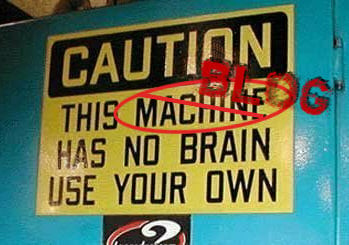Year of Original Content: Make Money From Copyright Thieves
 I and Jonathan Bailey of Plagiarism Today have long been advocates of copyright protections and education, leading the way with projects such as “Ask First,” the “Year of Original Content,” “5 Content Theft Myths and Why They Are False,” and “The 6 Steps to Stop Content Theft.”
I and Jonathan Bailey of Plagiarism Today have long been advocates of copyright protections and education, leading the way with projects such as “Ask First,” the “Year of Original Content,” “5 Content Theft Myths and Why They Are False,” and “The 6 Steps to Stop Content Theft.”
It seems that the rest of the world is waking up to the fact that stolen content is big business. Within the past two years, there are a variety of services you can use to track where your online content has gone, report and stop it. A new project is underway called the Fair Syndication Consortium that might put a dollar amount on that stolen content, paying you for others abusing your content.
In an article called “Should Ad Networks Pay Publishers For Stolen Content? The Fair Syndication Consortium Thinks So.” on TechCrunch, Erick Schonfeld talks about the Fair Syndication Consortium, a project by Attributor that also includes a consortium of media publishers such as Reuters, the Magazine Publishers of America, Politico, and others, to fight back against, and make money from, those who use other people’s content, specifically theirs.
The Fair Syndication Consortium is initially trying to address a legitimate problem on the Web: the proliferation of splogs (spam blogs) and other sites which do nothing more than republish the entire feed of news sites and blogs, often without attribution or links. There are tens of thousands of these sites, perhaps more. Rather than go after these sites one at a time, the Fair Syndication Consortium wants to negotiate directly with the ad networks which serve ads on these sites: DoubleClick, Google’s AdSense, and Yahoo primarily. For any post or page which takes a full copy of a publisher’s work, the Fair Syndication Consortium thinks the ad networks should pay a portion of the ad revenues being generated by those sites.
Erick talks about meeting with Attributor and the new Consortium and learning about the numbers behind the stealing of other people’s content. In one example, assuming a USD $0.25 CPM (Click Per Million) value, approximately $13 million could be earned by the ad revenues on splogs using publishers’ content.
That’s a lot of money going to those who benefit from the abuse of other people’s content. So why not get a cut? It’s your content. It’s your hard work. It’s your work!
In the past, we’ve tried attacking spam blogs by stopping the spread of their blog comments via tools like Akismet and demanding that services like Google’s Blogspot clean up the splog abuse on their services while profiting from the ads generated by the abusers. I’ve long been a proponent of stopping splogs at the source, but people don’t seem very responsive to that idea, allowing black hat bloggers to proliferate the web, and the sites that continue to host them to benefit as well. It appears that money talks louder than moral fiber.
The newest proposal by the Fair Syndication Consortium is to go after those who pay sploggers, the ad networks that permit ads to be put onto stolen content.
Go after those three ad networks, and the majority of the problem could be solved. There is certainly precedent for this type of approach. Look at YouTube’s Content ID program, which splits revenues between YouTube and the media companies whose videos are being reused online. Except this proposal would take money that would otherwise be distributed to the splog sites themselves, and give a portion of it to the publisher as an automatic syndication fee without the consent of the site owner.
Jonathan Bailey calls it “getting paid for being copied.” He says:
Content monitoring company Attributor, announced a new initiative yesterday, entitled the Fair Syndication Consortium, which it hopes will revolutionize the way publishers of all sizes deal with content reuse by turning copyright infringement and plagiarism into a profit center.
The consortium hopes that, by working with advertising companies, they can redirect a percentage of revenue from sites that use content without permission. This will, in theory, reduce the amount of DMCA notices filed and will content copying and redistribution rewarding for both content creators and for those performing the distribution.
Right now, this would benefit the big publishing companies as they can afford to support such services and the technology for tracking and invoicing the various agencies involved. However, Attributor offers FairShare a free service that helps bloggers and others track what content of theirs is being abused, and others are working on similar projects. What services would be available for regular bloggers to get money back from the advertisers who permit others to abuse your content…that’s the big question we all are waiting to be answered.
There are a lot of other questions that have to be considered before you could really benefit and see the money from those who use your content without your permission.
How Vague Can Your Copyright Policy Be?
There would have to be guidelines on copyright policies before compensation and participation in such programs could be implemented.
If your copyright policy is vague or licensed for free use of your content, then there isn’t much you can ask for if you aren’t specific up front. For example, your copyright license may say “no commercial usage” but what does that mean? Does that mean using your content on a site that pays their authors (but not you), on a site with ads (how many ads define commercial?), or just any site that someone uses to generate any income?
How much of their content could they use before crossing your copyright policy barrier to prevent the content use or generate compensation? I like the 10% or 400 words policy, but others are more flexible.
Since tracking copyright violations are done with machines, some parameters need to be established, possibly even customizable to the needs of the copyright holder’s desires, before you could participate. What would those look like?
What Kind of Compensation Do You Expect?
What would compensation look like? That’s another important question to consider.
Would a link back be enough? If all you want is credit to the source, you, then maybe a link back is enough compensation.
For others, it’s not. If money is being made, people want a piece of the pie. So how much compensation would you expect from such a program? And how much would you be willing to pay or give back as part of Attributor or other companies collecting fees?
The copyright tracking and invoicing companies are in this for the money. And there is a ton of money to be made. Participation in such a program would have to be financially beneficial to the member, but there is more to the process than that.
 I participated in the early days testing of Attributor’s FairShare program and while it has drastically improved, it can be a time consuming to check and verify if the content is really being stolen and if the site meets my copyright policies for full or Fair Use usage. The more work involved in tracking, reporting, and identifying those who abuse our content, the more compensation I want in return.
I participated in the early days testing of Attributor’s FairShare program and while it has drastically improved, it can be a time consuming to check and verify if the content is really being stolen and if the site meets my copyright policies for full or Fair Use usage. The more work involved in tracking, reporting, and identifying those who abuse our content, the more compensation I want in return.
The easier the process, especially if I as a user would have to do little or nothing other than sign up and set up a few criteria parameters, the more willing I would be to give up 5 – 25% of the income derived from such a service. Better yet, a flat fee based upon whatever criteria the service would offer, like USD $25 to $100 a year.
This is an evolving business model, helping writers, photographers, musicians, publishers, and bloggers get money back from the abuse of their content, and it is, indeed, big business. What do you think it will look like? What do you want out of it? What are you willing to put into such a program?
And would you even participate?
The author of Lorelle on WordPress and the fast-selling book, Blogging Tips: What Bloggers Won't Tell You About Blogging, as well as several other blogs, Lorelle VanFossen has been blogging for over 15 years, covering blogging, WordPress, travel, nature and travel photography, web design, web theory and development extensively as web technologies developed.


Lorelle – this is really helpful guidance for how we improve FairShare and specifically implement the ad revenue sharing functionality. We are definitely taking notes and encourage you and others to join the Fair Syndication Consortium so you can shape how its development.
Ha! I like the picture you have pinned up.
Fair Syndication Consortium sounds very interesting. It might take some time to be put into play, though. Like you have stated, money talks.
Copying a blog is an act of getting some item that is not belong to you. So if you really want to repost the article or blog post you must indicate where did you get that article or the source so that and in return you can give a credit to the author of the said article. Be fair in your action and stay good in making money!
Fair Syndication Consortium sounds very interesting. It might take some time to be put into play, though. Like you have stated, money talks.